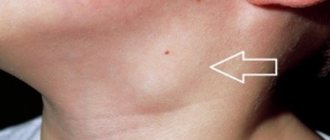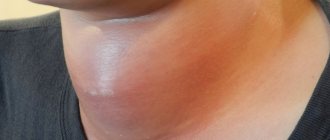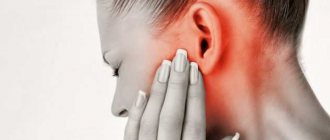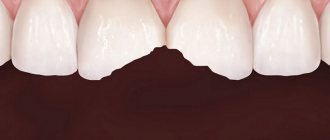Pathogenesis of neck pain on the left side
Pain can be caused by a variety of reasons. A symptom often indicates the presence of pathology and its progression or exacerbation. As a rule, pain in the left neck appears due to:
- osteochondrosis in this part of the spinal column;
- infectious processes (colds, etc.) that provoke inflammation of the lymph nodes in the neck;
- injuries to the muscles or ligaments of the neck;
- pinched nerves with subsequent inflammation;
- muscle spasms, which are provoked by high levels of stress, hypothermia, drafts, etc.
How often a person will experience neck pain depends on age and the specifics of their lifestyle and work. If you have a sedentary job, don't like walking, and don't exercise even minimally, you'll most likely experience discomfort in your neck more often.
Diagnostics
A neurologist is involved in determining the nature of the disease that provokes pain in the left half of the head. According to indications, a rheumatologist, oncologist, and otolaryngologist are involved. Primary cephalgia (migraine, cluster and hypnic headache, paroxysmal hemicrania) are diagnosed based on clinical symptoms, auxiliary methods are prescribed to exclude organic pathology.
In other cases, when establishing a diagnosis, they rely on both objective data and the results of imaging and laboratory techniques. The examination program includes the following procedures:
- Echoencephalography.
It is produced to measure intracranial pressure and helps to exclude conditions accompanied by intracranial hypertension. Despite the possibility of detecting volumetric processes, in the early stages of tumors it may not be informative due to the small size of the formations. - Assessment of cerebral blood flow
. Includes duplex scanning, ultrasound examination of the vessels of the head and neck. As part of differential diagnosis, it allows you to detect hemodynamic disorders characteristic of atherosclerosis and other diseases. Recommended for patients with vertebrobasilar insufficiency to clarify the nature and structure of the stenosis. - Radiography
. Standard photographs of the cervical spine reveal signs of hernia, osteochondrosis and other diseases of the spinal column. To confirm extravasal compression of the vertebral artery, radiographs with functional tests are taken. For sinusitis, an X-ray of the paranasal sinuses is performed, and for mastoiditis, an X-ray of the temporal bone is performed. - Tomography
. MRI of the brain is prescribed for suspected tumors and arachnoiditis. In angiography mode, it provides comprehensive information about the condition of the main arteries. If a vertebrogenic etiology of pain is suspected, MRI and CT of the cervical spine are performed. For sinusitis, an MRI of the sinuses is sometimes performed.
Consultation with a neurologist
Types of neck pain
To identify the causes of pain in the left neck and prescribe treatment, you need to pay attention to the nature of the pain, the frequency of its manifestation, as well as the conditions under which the pain intensifies. All this will help to more accurately determine the cause and undergo exactly those diagnostic measures that are needed in your case to confirm the disease.
Pain in left front
In this case, problems may be associated with inflammation of the pharynx, tonsils, and vocal cords, which leads to pain in the left side of the neck in front. If the process is bilateral, the same sensations will appear on the other side. In this situation, a person has symptoms associated with inflammation - sore throat, cough, fever, etc.
Pain in the left back of the neck
If pain appears in the left neck, the cause may lie in osteochondrosis of the cervical spine. The nature of the pain can be cutting, shooting, aching, but in any case, such a symptom will provide constant discomfort. The same sensations are provoked by a hernia in the cervical spine. Often the problem lies in spinal stenosis, which leads to a narrowing of the spinal canal. Most often, this disease affects the upper parts of the spine and can lead to compression of the spinal cord, nerve endings and subsequent disruption of the functioning of the upper extremities, numbness and severe pain.
Pain on the left side
The neck hurts on the left side for the same reasons as in the front and back. That is, pain syndrome can develop from hypothermia and muscle strain, as well as due to the development of osteochondrosis and other diseases of the spinal column in the neck. Often a person receives neck injuries in this area; the pain can even be caused by turning the head too sharply.
Left and goes to the head
In this case, the problem may be the development of osteochondrosis, injury to neck structures, as well as circulatory disorders. If you feel pain that radiates to the back of your head, it is worth measuring your blood pressure, since a common cause of pain is its increase. With atherosclerosis of the vertebral artery, the symptoms are more or less identical. If the pain in the left neck is acute, the cause may lie in occipital neuralgia. In this case, very strong, even unbearable pain will “rise” from the neck to the head, temples, and eyes.
On the left side under the jaw
In this case, muscles may ache, but most often the problem is that the tonsils are inflamed, the person has developed pharyngitis or laryngitis, and there are also problems with the thyroid gland, inflammation of which is called thyroiditis
.
Treatment of left-sided headaches
Treatment is prescribed only based on the results of the examination. There are various techniques that can be used in the hospital and at home. So, in case of a sudden headache, doctors recommend ventilating the room, doing a neck and head massage, drinking water and taking a short rest. If the discomfort persists, you can take medicine. The most common recommendations from doctors against headaches include:
- painkillers that relieve acute pain - they can be taken at home, but should not be abused unnecessarily;
- antispasmodics - relieve vascular spasm and restore normal blood circulation;
- massage - it’s worth making an appointment with a specialist who will also show you how to reduce pain at home;
- physiotherapy is effective for osteochondrosis, neck diseases and during the rehabilitation period after injuries;
- specific treatment - you may need a course of drugs to strengthen intervertebral discs (chondrol protectors), drugs to normalize metabolism in atherosclerosis and other drugs to treat the underlying disease;
- surgical treatment is rarely used; it may be recommended in the presence of tumors, cysts and foci of sclerosis that interfere with the normal functioning of the brain and tend to increase in size.
The Clinical Brain Institute specializes in the treatment of diseases that manifest themselves as headaches. Qualified specialists of a wide and narrow profile work here, and there is also the opportunity to undergo a full examination, including specific techniques. There are different ways to get rid of a headache, but only a doctor can suggest the most effective and safe one.
Causes of neck pain on the left side
It becomes clear that the area around the neck on the left can hurt for many reasons. It is worth learning more about each disease and determining the symptoms in order to roughly understand what triggered the development of pain and discomfort in the neck.
Osteoarthrosis and osteochondrosis
Osteochondrosis manifests itself in the fact that the cartilage tissue of the spinal column gradually begins to deteriorate. The intervertebral discs become thinner, the distance between them decreases, and nerve roots are pinched. Osteoarthritis also affects the joints of the spinal column.
Neck muscle damage
One of the most common cases of neck pain is damage to muscle tissue. If you hit yourself or simply overstrain your muscles by being in a not very comfortable position for a long time, or get too cold, inflammation may begin, accompanied by pain and sometimes fever.
Diagnosis of the disease
To understand what to do and how to treat if the neck on the left is very painful, first of all, the doctor needs to understand what caused the pain syndrome. It is not enough to relieve the condition by taking painkillers; you need to identify what the pain indicates and eliminate its cause. To determine the exact reasons you may need:
- x-ray
; - Ultrasound;
- MRI
; - general blood test, etc.
Based on the results of the diagnosis, the doctor will tell you why the neck hurts in the lower left and how to cope with this phenomenon in order not only to feel better, but also to eliminate the root cause.
How to treat pain on the left side of the neck
Most often, treatment is needed in the presence of pathologies of the musculoskeletal system in the cervical region. Treatment of pain may include the use of lidocaine and novocaine, injections of which are otherwise called “blockade”. This is necessary when the pain intensifies to unbearable. In other cases, various medications, physiotherapy and medical procedures are prescribed that relieve pain and inflammation and are selected individually.
Medicines
A nagging pain on the left side of the neck requires timely treatment, since otherwise the state of health will only worsen. Most likely, for pathologies of the structures of the musculoskeletal system, you will be prescribed:
- non-steroidal anti-inflammatory drugs, which should reduce pain and stop inflammation;
- muscle relaxants to relieve muscle spasms;
- chondroprotectors that will stop degenerative processes in the joints;
- drugs to normalize blood circulation;
- Antidepressants, which will reduce anxiety and nervousness, will create a favorable basis for treatment.
Sometimes, when shooting pain appears on the left side of the neck, you need to use hormonal medications, as well as warming ointments that are applied to the collar area. If you have pain in the neck, do not delay visiting a specialist, make an appointment with a doctor.
Treatment
Conservative therapy
Therapeutic tactics are determined taking into account the cause of the symptom. The basis is medicines, which in some cases are supplemented with non-drug methods:
- Migraine
. The attack is stopped with the help of non-narcotic analgesics and caffeine-containing drugs. Sometimes therapeutic blockades are performed. Very intense pain and prolonged attacks are indications for the use of triptans. For repeated vomiting, medications are administered subcutaneously, used in the form of sprays or rectal suppositories. - Cluster headache
. To eliminate paroxysm, triptans are prescribed, oxygen inhalations are performed, and local anesthetics are applied to the nasal mucosa. As part of prevention, calcium channel blockers are recommended; in case of intolerance, antiepileptic drugs or glucocorticosteroids are recommended. - Paroxysmal hemicrania
. The effectiveness of non-steroidal anti-inflammatory drugs, sometimes steroids, and calcium channel blockers is noted. Due to long-term use of painkillers, damage to the gastric mucosa is possible, so patients are additionally prescribed antacids and proton pump blockers. - Hypnic headache
. There is no uniform treatment regimen. It is possible to use lithium and melatonin preparations, hypnotics, benzodiazepines, NSAIDs, steroids and caffeine-containing drugs. - Vertebrobasilar system syndrome
. The treatment regimen includes medications with vascular, hypotensive and neuroprotective effects, anticoagulants, antiplatelet agents, and antidepressants. Non-drug therapy includes hyperbaric oxygenation, exercise therapy, vestibular exercises, massage, post-isometric relaxation, and magnetic laser therapy. - Arachnoiditis
. Anti-inflammatory, antiepileptic, absorbable, antiallergic and dehydration agents, metabolites, neuroprotectors, tranquilizers, and antidepressants can be prescribed. - ENT pathologies
. Antibacterial therapy, antihistamines and vasoconstrictor medications, immunocorrectors, UHF, and diadynamic currents are indicated. For sinusitis, punctures and sinus evacuation are performed; for mastoiditis, paracentesis of the tympanic membrane is performed.
Surgery
Patients with primary cephalgia do not require surgery. Surgical techniques can be used in the following cases:
- Insufficiency of vertebrobasilar blood flow
: carotid-subclavian bypass, endarterectomy. - Brain tumor
: removal of a tumor using microsurgical techniques or stereotactic radiosurgery methods, shunt operations for hydrocephalus. - Diseases of the ENT organs
: open and endoscopic maxillary sinusotomy or frontotomy, mastoidotomy, sanitizing and general cavity interventions on the middle ear. - Spinal lesions
: laser vaporization, microdiscectomy, interbody fusion, fixation with cages.











